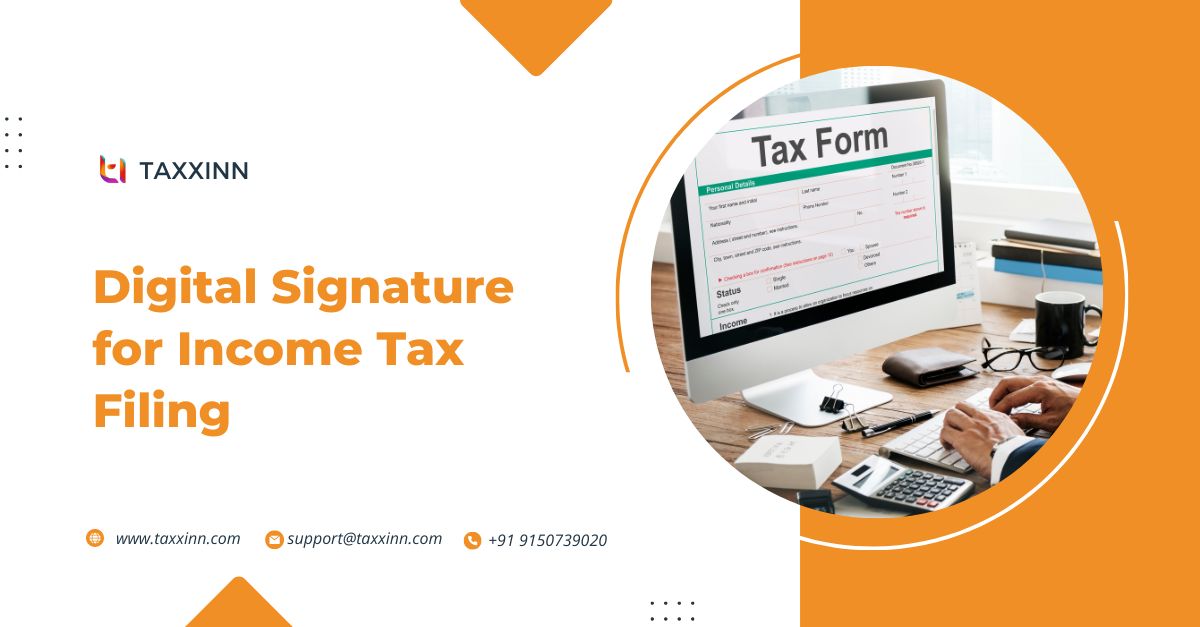A digital signature is a type of electronic signature used to verify an individual’s electronic papers. For example, a digital signature allows you to file your income tax return more easily and securely.
According to the Information Technology Act of 2000, a digital signature has the same status as a traditional or normal signature. It is used to authenticate and verify your tax return paperwork, ensuring no fraud. This blog explores how, why, and the uses of digital signatures for income tax e-filing.
What are Digital Signature Certificates (DSC)?
Digital signatures are the modern equivalent of handwritten signatures but with a higher level of security and authenticity. Utilising public key cryptography, digital signatures validate the sender’s identity and ensure that the message has not been altered. The process involves a pair of keys – a private key for signing and a public key for verification. When a document is signed digitally, a unique cryptographic hash is generated, which is practically impossible to forge without access to the private key.
Importance in Modern Transactions
In today’s digital age, the importance of securing online transactions cannot be overstated. Digital signatures play a crucial role in this by providing a reliable method for verifying the authenticity of documents. This is especially vital in transactions involving sensitive information, such as financial data, where the risk of fraud and identity theft is high. By ensuring that the information is accurate and unaltered, digital signatures build trust in electronic communications and transactions.
Digital Signatures and Income Tax Filing
Filing income tax returns is a must for all taxpayers in India. When filing these returns electronically, a digital signature is necessary. A digital signature for income tax is a safe method of authenticating electronic documents while ensuring their integrity and origin. This provides simplicity and security while ensuring the information entered is real and unaltered. It makes it easier for taxpayers to meet their obligations accurately and timely.
Necessity of Digital Signature for Income Tax
According to Section 44AB of the Income Tax Act, professionals and individuals with an annual gross income of 25 lakhs Rs. or more are required to e-file their income tax returns. Businesses with an annual turnover of Rs.1 crore or more are required to file ITRs online.
Role of Digital Signatures in Tax Filing
A Digital Signature Certificate (DSC) is the electronic version of a physical or paper certificate. DSC acts as confirmation of identity for an individual or organisation for a specific purpose online or on a computer. DSC authenticates electronic documents in the same way that a handwritten signature authenticates printed or handwritten documents. It can be used to e-verify returns filed by taxpayers and is also a must in some situations.
E-filing customers who have chosen this option must use a DSC to sign Income Tax Returns / Statutory Forms or to validate responses to notices issued by the Income Tax Department and refund reissue requests. To sign or validate a document, the user must first register their DSC with the e-filing system.
Class 3 Digital Signature for Income Tax e-Filing
A Class 3 Digital Signature Certificate (DSC) is essential for Income Tax e-filing in India, especially for certain categories of taxpayers like companies, LLPs, and individuals with high-value transactions. This digital certificate ensures the authenticity and integrity of the electronic documents filed with the Income Tax Department, providing a secure and efficient way to sign and submit income tax returns online. With a Class 3 DSC, taxpayers can streamline their e-filing process, ensuring compliance with legal requirements and reducing the risk of fraudulent activities.

Benefits of DSC Over Traditional Methods
Compared to traditional methods, digital signatures offer numerous advantages. Firstly, they eliminate the need for physical paperwork, thus reducing the administrative burden on both taxpayers and tax authorities. Secondly, digital signatures provide real-time validation, which accelerates the processing of tax returns. Lastly, the use of digital signatures helps in maintaining a digital audit trail, which is invaluable for future reference and legal compliance.
The DSC program simplifies and streamlines the e-filing process for IT returns. It is also regarded as a secure method of filing the Income Tax Return (ITR). Furthermore, some of the key advantages are listed below:
- A digital signature provides better security than any other type of signature, whether traditional or electronic.
- Digital signatures are recognised by the Indian government, as well as the majority of governments throughout the world.
- The dangers of hackers or phishing emails stealing sensitive data are minimal.
- Your documents are secure and cannot be modified or amended after signing.
- Prevention of Fraud and Identity Theft: Digital signatures play a pivotal role in preventing fraud and identity theft in tax filing. The signer, who alone knows the private key used to generate the digital signature, can confidently verify the authenticity of the signed document. This approach minimizes the risk of fraudulent submissions and protects sensitive taxpayer information from being compromised.
- Streamlined Filing Process: The adoption of digital signatures has significantly streamlined the tax filing process. By allowing electronic submission of tax returns, digital signatures eliminate the delays associated with mailing paper documents. Taxpayers can sign and submit their returns from anywhere, at any time, which simplifies the entire filing process.
Reduced Paperwork and Errors: Digital signatures also contribute to a reduction in paperwork and human errors. The traditional paper-based filing system is prone to errors such as missing signatures, incorrect information, and misplaced documents. Digital signatures automate the verification process, ensuring the correct capture of all required information and reducing the likelihood of errors.
How to Register a Digital Signature when E-Filing Income Tax Returns
1. Register on the Income Tax Department’s e-filing portal.
2. Log in to the e-filing website using the registered account’s password and user ID.
3. After you’ve logged in, go to the ‘My Account’ button and select ‘Update Digital Certificate’.
4. The file download procedure with the name ‘Store Certificate’ must begin automatically. The digital signature copy is saved locally on your computer.
5. Return to the webpage and click ‘Upload your USB Token’. This takes you to the following screen, which includes a button asking you to pick the USB Token Certificate and then click ‘Browse’. Clicking this button opens a window where you may select a downloaded file.
6. Select the file and click ‘Okay’. After that, enter the ‘PIN code’, which is the password for the Token, and then click ‘Sign’.
Best Practices for Taxpayers
Choosing the Right Digital Signature Solution
When selecting a digital signature solution, taxpayers should consider factors such as security features, ease of use, and compliance with legal requirements. It is important to choose a reputable provider that offers robust encryption and reliable support. Additionally, taxpayers should ensure that the solution is compatible with the tax authority’s systems and requirements.
Ensuring Data Privacy
Protecting personal data is crucial when using digital signatures. Taxpayers should take steps to secure their private keys and use strong passwords. It is also advisable to regularly update software and be vigilant against phishing attacks. By following best practices for data privacy, taxpayers can safeguard their sensitive information and prevent unauthorised access.
Conclusion
A digital signature for income tax in India is essential for everyone, including businesses and professionals. They ensure security, authenticity, and convenience throughout the taxing procedure. This makes it easier for taxpayers to comply with tax rules and regulations and carry out their tasks properly. Obtaining a digital signature for income tax filing can be done easily with Taxxinn.
Related Reads,
How to Register DSC on the Income Tax Portal?

